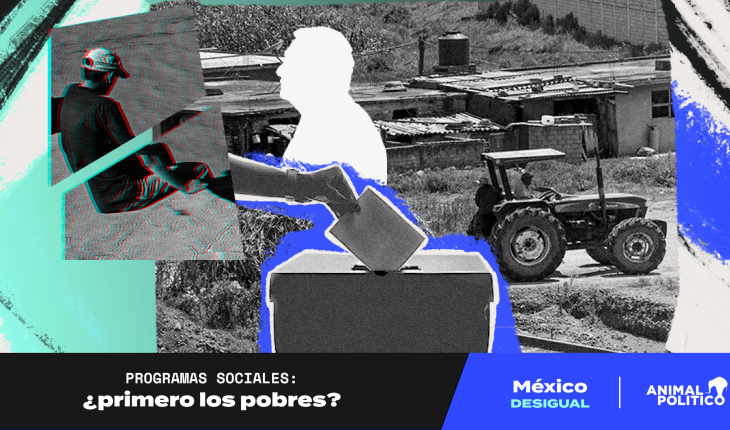Fellows who participated in the Youth Building the Future program have denounced that while working as apprentices of Servants of the Nation, they have received instructions to operate and get votes in favor of politicians and candidates.
In Hidalgo, for example, last January a complaint was filed with the Secretariat of the Public Function, as recorded in the file with folio 2127/2021/PPC/BIENESTAR/DE53, which was received by the Internal Control Body of the Secretariat of Welfare through the SIDEC platform (Citizen Complaint of Corruption).
“In the Regional Delegation of Zone VII in Tulancingo Hidalgo, the Delegate and Coordinator of Federal Programs in the Secretariat of Welfare, Mili Estefani Batalla Castillo, along with her husband Carlos Alberto Belmonte Velázquez, have hired most of the Servants of the Nation, under the condition that they support the political aspirations of Belmonte,” according to the complaint obtained by Political Animal.
Carlos Alberto Belmonte Velázquez was a candidate for the candidacy of municipal president of Tulancingo with the Morena party.
This is not the only case.
Read: Youth Building the Future: away from marginalized municipalities and only half finish the scholarship
In February of this year, other fellows who attended the Integrative Development Centers, in charge of operating the social programs, were summoned by their coordinators for a meeting.
When they arrived, they were given some forms to register the name, telephone and signatures of 30 people. “They told us to do everything possible to get them to give the vote, to be safe votes,” in favor of the PRI candidate for municipal president of Acaxochitlán, Salvador Neri Sosa.
According to the testimonies collected by Political Animal, the fellows were told that “the communities already have the trust in them, and people identify them, wherever you tell them, people are going to leave.” Therefore, they had to “convince the largest number of people” and in return they were promised that at the end of the scholarship they would have “a secure job” as Servant of the Nation.
“I thought, ‘If I don’t, maybe you’ll be discharged. Yes, you are afraid. Or if you don’t, they find a way to harass you,” says Teresa, one of the fellows. Georgina, another one, comments that “people were surprised, they said ‘but if you are from Morena why are you supporting the PRI'”.
Both fellows were also under the coordination of the regional delegate Mili Batalla, who, together with her husband, Carlos Belmonte, organized the Servants of the Nation and against whom the complaint was filed with the SFP.
Verifications: existing companies or without a trace
Political Animal obtained the list of beneficiaries of the Youth Building the Future program after a request for transparency, and with the organization Data Cívica was listed to the work centers with the most registered scholarship holders in 2019.
With this, each center was searched in public sources such as the registry of social organizations of the National Institute of Social Development (Indesol), business directories, its social network pages and the validity of its RFC was verified.
From a list of 20 individuals and legal entities, seven turned out to be duly registered civil associations that participated in the program to organize workshops and trainings, and even responded to interviews to tell their experience.
Find out: Government used 322,000 Youth Building the Future fellows to replace civil servants
These are the Fundación Esperanza de los Niños AC (with 1,377 scholarship holders), Movimiento Urbano Por ti (797); Asociación Nacional de Empresas Comercializadoras de Productores del Campo AC (581); Council of Peasant Organizations and Rural Enterprises (564); Lalana in Ac Action; Strategic Front of Social and Agroecological Development of Chiapas FEDESACH (368) and the College of United Agronomists for Sustainable Development of Chiapas A.C. (338).
But there were seven other companies that could not be located, such as Crecimiento Estratégico Global con Calidad S. A. de C. V., which registered 384 fellows, Jóvenes por un Veracruz Digno (377 fellows), Kuj Lajuk Ja Tijumotik Assi AC (346), Hermanos Hernández (231), Producción el Café Monte Verde (227); of which there is no public information in any source, not even in social networks.
While the addresses of Coordinadora Juventud y Cultura, with 358 registered young people, and Planta Purificadora de Agua San Pedro, with 221 scholarship holders, are erroneous because the streets do not exist in the neighborhoods or municipalities.
In fact, the Superior Audit of the Federation pointed out as a “risk” not to ensure the formality of the work centers, because of 1 million 120 thousand companies registered in 2019, 29% (57 thousand) did not present RFC, as it is an optional requirement.
“(This) could cause the program to incorporate informal companies that operate with low wages, lack of social security coverage and cause job instability,” the forensic compliance audit number 374-DE warned.
Although in theory, since a company applies for registration to be part of the program, the Ministry of Labor confirms its identity and verifies its operation on land, but given the number of work centers, the challenge is great.
In the organizational chart of the program there is the figure of ‘mentors’, who are responsible for verifying each of the work centers on the ground and passing the report to their superiors at the municipal level who, in turn, must send it to the state managers and finally to the Ministry of Labor that validates the information.
According to the agency, there are 119 ‘mentors’ in the northern zone; 116 in the central region 1; 82 in center 2; 137 in south zone 1 and 80 in south 2. That is, 534 mentors to verify 195 thousand work centers, so each one has to review 365 properties.
And, according to the guidelines, each center must be verified three or four times a year.
These mentors are also Servants of the Nation, the figure created in this administration that was also responsible for carrying out the so-called Welfare Census, looking for beneficiaries of social programs or even helping in the brigades of application of vaccines against COVID-19, without requiring a specific profile or training for each task.
Read more: Youth Building the Future Fellows are unprotected from accidents
Francisco Briones worked as a Servant of the Nation to contribute to his community and the project of President Andrés Manuel López Obrador, he says, but operational complications, electoral use and the reinforcement of local chiefdoms made him defect within a few months.
He explained in an interview that the field verification of the companies of Youth Building the Future works from an application of the Ministry of Labor that displays the directions they should look for, approximately 25 a week.
However, the workload is greater when the municipalities are difficult to access and with poor public transport, because for this work the agency does not give them a vehicle or pay them per diems.
Once the verification form is filled out in the application, they have no way to see the address again or correct information, because it disappears from their list. In his experience, of his weekly reviews he located 70% and the rest did not exist.
That is why mistakes occur when verifying, as he published. Political Animal On Tuesday, legally constituted non-governmental organizations reported having been removed from the program due to erroneous reports in the verifications.
They explained that they were discharged because the mentors could not find the young people at the time of the verification, but in several cases they were doing activities in the field or in the communities. And although they submitted documentation to the Ministry of Labor to prove their existence, they failed to re-enter the program.
Other irregularities
Roberto, 26, chose a small pig farm business to be an intern in Oaxaca, but two months after being in the program, the person from the community who advised the young people to do the procedure online – because most do not have a computer or know how to use the registration platform. he demanded a cooperation of 200 or 300 pesos per month for alleged aid expenses.
If she did not deliver the money, she told them that she would unsubscribe them from the system, since she had users and passwords, the essential data to enter the digital platform of the program, the only mechanism of contact with the Ministry of Labor and in which the work centers are evaluated, a change of location is requested or any setback or anomaly is reported.
“Did anyone report that they were demanding money?” —Roberto is asked.
“The young people here are manipulated and are afraid to make a demand or tell the truth because if any of us complained they would let us down.
Read: Youth Building the Future: No One Verifies Scholarship Holders Trained, Says Coneval
The young man asked not to publish his name or that of his community because the person he refers to is a neighbor and continues to ask for the amount to help the fellows. “I don’t want to make things bigger because I’m afraid something is going to happen to me. I don’t have resources and I don’t want to be harmed.”
The organization Lalana en Acción also denounced irregularities. Sent a letter to the president on July 8 of 2019, months after having started the program, although it has not had any response after two years.
“Young people enrolled in other workplaces receive their support without receiving any training, there are agreements between the tutor and the scholarship holder because most of them are relatives. They will only take the photo on the day of the evaluation, others are used as domestic workers, and many more without any kind of activity,” they said in the letter.
The intention of denouncing, as explained in the document, was that they attend and correct the misuse of the program, since the young people were involved.
“In itself we have a rather complicated situation in the region due to the conflicts between cartels, there has not been a week that they do not appear dismembered, shot and disappeared in our towns, so our concern with young people because they are easy prey for organized crime activities and drug sales. They have easy money now because of the support of the program, but when they no longer have it, it will be theirs and us citizens?”
The president of the organization Lalana en Acción also denounces that in October 2019, when more than 500 young people were a few months away from finishing their first year of scholarship, Morena’s candidate for the municipal presidency of Santiago Jocotepec, Oaxaca, sought her out to ask for “her support” in the election.
“He told me to condition young people to vote for him. If I shook his hand with the young people we had, then he was going to give us support,” Elena says in an interview. She rejected the proposal.
Soon they began to have problems with their registration on the program’s platform. “They left us a notice that they went to the home and that we were not there. I sent an email to the Secretary of Labor to come back, but they didn’t come back.”
Since then, Lalana is not enabled on the platform so that young people could choose it as a workplace.
What we do at Animal Político requires professional journalists, teamwork, dialogue with readers and something very important: independence. You can help us keep going. Be part of the team.
Subscribe to Animal Político, receive benefits and support free journalism.#YoSoyAnimal





